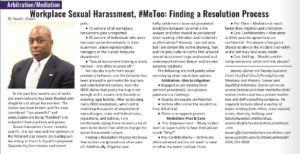Archive for year: 2018
An Alternative to Litigation: “3 Effective Negotiation Strategies”
/in Civil, General /by szamor@effectivemediationconsultants.com“Ultimate excellence lies not in winning every battle, but in defeating the enemy without ever fighting…” –Sun Tzu.
As a mediator I continue to study the Sun Tzu’s the “Art of War”. Not because I support War/conflict but rather, I believe that to effectuate collaborative solutions one must be prepared for multiple manners of “warring”. The Art of War offers a great amount of wisdom that can be used in a variety of industries. As a mediator I have observed disputants being counterproductive throughout a mediation conference because they are too focused on winning, although they both were very interested in avoiding a trial. It takes a great amount of awareness to help those achieve what they say they want, without them feeling like they gave up what they need…
Negotiation opponents often think that the only way to negotiate is to intimidate and by a show of power. There are a multitude negotiation approaches/styles and they all have distinct advantages and disadvantages. The following are the 3 that I’ve seen initially be more effective:
3 Negotiation Strategies
- Reduce the Conflict – Conflict is expensive. Before you engage in a lengthy litigation matter or negotiation effort, be honest and strategize on the business of conflict. If there are a multitude of issues, try reducing them to the most essential points of conflict. Often when you have a chance to narrow down the issues that need to be address, you narrow down the cost/time that may be incurred.
- “Enlarge the Pie”– A rarely used technique is to creatively broaden the options of agreeable outcomes. Often disputants only come to negotiate with limited ideas of what is owed or due to them. So, in turn they negotiate with a limited view of possible outcomes. When you negotiate from a position of having plenty of outcomes you tend to be more flexible and reach agreement easier. By “enlarging the pie” you create the tone that greater options are available to those with the willingness to seek greater options.
- Separate the Person from the Issue – “If it is only business, keep it that way!” Behavior during negotiation is key, and perception is everything. When parties state “…it is just business, this is a simple case…”, I always expect more much more. We are all human and therefore what should be simple can easily turn into frustration and lashing out when the other side just doesn’t see how wrong you think they are. Be mindful of harsh negotiations turning into name-calling or personality trait bashing. To reduce the frustration/emotions, it is always better to objectively remain on the matter in dispute and not who is doing the negotiating.
Mediation is artfully delicate process and should be facilitated by a professional neutral with the unique skill sets that promote collaboration, party self-determination while encouraging negotiations.
Stanley Zamor is a Florida Supreme Court Certified Circuit/Family/County Mediator & Primary Trainer and Qualified Arbitrator. Mr. Zamor serves on several federal and state mediation/arbitration rosters and has a private mediation and ADR consulting company. He regularly lectures on a variety of topics from ethics, cross-cultural issues, diversity, bullying, and Family/Business relationships.
A New Year of Resolve: Saying Goodbye to LAST-YEAR’S Litigation and Hello to THIS-YEAR’S Agreed Settlement
/in Civil, General /by szamor@effectivemediationconsultants.comBy Stanley Zamor
“It’s 20XX. Time to let LAST-YEAR go! You decide. It is time to accept and expect THIS-YEAR to be the year of RESOLVE!” During the various mediations I facilitated in 20XX, a common theme I heard by participants to explain their discourse, was that 20XX was a year of build-up, peculiarity and conflicts that seemed to spiral out of control; so the parties (and their attorneys) were ready to settle. Although parties, and their counsel, self-described the dispute(s) as being “simple”, as the mediation process progressed, simple issues revealed themselves more intractable. As a professional neutral I am not surprised by parties being unrealistic about the simplicity of their issues (and their resolve). Managing expectation is not a problem, and it is what a trained professional neutral is trained to do.
So, how do mediation participants leave the past and the old year behind (analogous to litigation); and move forward like a New Year’s Eve countdown, eager to see the ball drop in Times Square, and at the stroke of midnight, be ready to usher in a new year, a new resolve, an agreed settlement? The anticipation and expectations of a new year bring new hopes, new dreams, and the achievement of new goals. But timing is the key; and unless participants are ready to reach a resolution, they will not settle. To gauge unsure participants and their preparedness to settle, after their 2013 cynical statements, I offered for consideration, “…Preparing a mediation settlement agreement is like preparing for a new year, with New Year’s resolutions. You craft your goals, and how you want your present and future to be; while litigation focuses on the past year that is now gone. Litigation forces you to relive regrets, wrongs, missed opportunities and hurts. Although litigation is your right, and allows you to receive a decision, others ultimately assign a value to your position, with which you may not agree. Your hurt feelings and intangible concerns are rarely addressed in litigation; and the ‘I SHOULDAS, I WOULDAS, I COULDAS…But I DIDN’T…’ do not get expressed. However, during a mediation session, there is usually an opportunity to address such concerns and that is when it becomes easier to start fresh, new, and agree to resolve the matter through an agreed settlement…”
After further dialogue and self-assessments, most of the participants saw the value of reaching a settlement agreement that day and were ready to resolve the matter. I was told that after the mediation session, the settlement agreement created gave them the ability to move forward, onward and upward. Holding on to the past through litigation felt like dwelling on the “yesterday”, it held them back; and also, living to litigate a case, continued to hurt more than help. While creating and preparing a settlement agreement, helped set clear future goals, let them be heard and more importantly, allowed for forgiveness and the acceptance of an, “I’m sorry…”. HAPPY NEW YEAR!
(updated, 2018)
“Let’s Make A Business Decision, Let’s Mediate”
/in Civil, General /by szamor@effectivemediationconsultants.com“Let’s Make A Business Decision, Let’s Mediate”
By Stanley Zamor
(July 2017)
“Greg, if you would have better advised me of the extensive cost of this litigation, I might not have let it go this far. But now, I am so financially committed, I have to see it through, even though it may bankrupt me…” I stated, “Although you are heavily engaged in litigation, now that you are at mediation, you have a real opportunity to reduce further expenses while reaching a resolution you create…” Unfortunately, this was a real statement made by a Plaintiff expressing his frustration to his attorney. The mediation ended, and resulted in a settlement 3 hours later.
The Real Cost of Litigation
We live in a great country where our legal system is not perfect, but is available to those who choose to use it. So how expensive is litigation anyway? Um, although the initial cost of a civil suit varies depending on the lawyer you choose and the type of case, it is not unusual for either party to spend close to $100,000 in a contentious business lawsuit. How? Well, a brief example is when taking the deposition of five people, who are potential witnesses:
* Attorney’s replenishable retainer of $5,000, used for initial costs/filing and commencing discovery of the lawsuit;
* Attorney charging $300 per hour – research and preparation for five, eight hour witness depositions – $2400 x 5= $12,000. Further consider the cost of travel and deposition transcripts (usual cost $1000 each x 5= $5,000);
* Other basics litigation costs include (but is not limited to) hiring expert witnesses; research/study of reports, analysis, or other projects ordered by the court; attorney hourly fees; copy fees; computer legal research services; secretarial and paralegal fees; external consultants, and specialist fees; private investigator, electronic discovery maintenance, and trial demonstrative aids, etc.
The Truth Is Real
Unfortunately, even though our civil litigation system is considered to be the best in the world, it is so costly, and the rewards (if any), are sometimes too far delayed to enjoy the benefits. So that is why mediation is available and the courts are encouraging parties to mediation early as an alternative to trial. In many areas of the law, like in Condo & Home Owners Association cases, you must mediate before you litigate.
The Cost of Mediation
Contrary to litigation mediation cost fractions less and mediating before you file a lawsuit can save you tens of thousands of dollars. The comparative math is:
* Typically, mediators charge $300 per hour for five-hours. (shared between the parties) So, $1500, and you are done!
* If you have an attorney, add the cost of their time too. Regardless, your cost can be under $3000 and you’ve reached a resolution that you’ve created and controlled. When you litigate you will triple that cost for the uncertainty of an outcome. Hmmmm… Make a business decision, you have options.
Stanley Zamor is a Florida Supreme Court Certified Circuit/Family/County Mediator & Primary Trainer and Qualified Arbitrator. Mr. Zamor serves on several federal and state mediation/arbitration rosters and has a private mediation and ADR consulting company. He regularly lectures on a variety of topics from ethics, cross-cultural issues, diversity, bullying, and Family/Business relationships.
szamor@i-mediateconsulting.com
www.i-mediateconsulting.com
www.LinkedIn.com/in/stanleyzamoradr
(954) 261-8600
“Getting What You Want in Mediation”
/in Civil, General /by szamor@effectivemediationconsultants.com“Getting What You Want in Mediation”
By Stanley Zamor
(January 2018)
Set The Stage
As the parties entered the room, I stood smiling and welcomed each person as they took their seat around the conference table. I stood at the head of the table and observed the perfectly quaffed group of 10, they all seemed to share the same blank expressionless face. Something recently happened… And that something was not good. As each side gave their opening statement they mentioned the results of a Summary Judgement hearing that took place just 2 hours prior to the commencement this mediation. The judge made a partial ruling that both parties claimed to give them some sort of victory.
In brief, for over 3 years of litigation multiple businessmen, in two consolidated cases, spent millions of dollars to prominent law firms to keep pushing their positions until the eve of trial. But now, after long eloquent statements outlining how the law supports their position(s), I asked them something that seemed to perplex the entire group. I asked, “Now that we have heard each perspective and how right each party thinks they are; what do you want?…” They all agreed that they wanted finality and (read below for the rest). I said, “Good. Then let’s get to work…”
At The Ready…
One of the difficult defining points of mediation is to reduce the barriers of communication. Litigation is innately adversarial in tone and process. Mediation conversely encourages collaboration while reframing the tone of the dispute, to where parties may feel able to design their own resolution.
Often, once a case is filed in court, disputants never see each other outside of a court related event. Since mediation is an informal process, disputants have an opportunity to use their own words during mediation in a conversational tone, and not only in the usual adversarial posture. A skillful mediator can use that opportunity, to shape the discussion to where both parties can feel heard/good about being flexible and seeing where resolution may creatively lie.
Mediation will not replace litigation, it is simply an option that works when parties need an alternative. Legal rights and duties are important but many times when parties are given a neutral space to express what they want, they are able to resolve issues themselves.
Their Wants:
So, what did these disputants want, and did mediation give to them? The following are a few of the things that the disputants told me they wanted and after a 5 hour mediation, they created an agreement that was satisfied with:
- Someone to admit wrong and to be held accountable,
- To be able to move forward and beyond that business dispute,
- To take the lessons learned and establish better systems to limit/protect themselves from future litigation,
- To recoup/cover a portion of monies spent on legal fees,
- To make more money, smarter.
Stanley Zamor is a Florida Supreme Court Certified Circuit/Family/County Mediator & Primary Trainer and Qualified Arbitrator. Mr. Zamor serves on several federal and state mediation/arbitration rosters and has a private mediation and ADR consulting company. He regularly lectures on a variety of topics from ethics, cross-cultural issues, diversity, bullying, and Family/Business relationships.
szamor@effectivemediationconsultants.com
www. effectivemediationconsultants.com
www.LinkedIn.com/in/stanleyzamoradr
(954) 261-8600
Workplace Sexual Harassment: #MeToo & Finding A Resolution Process
/in Civil, General /by szamor@effectivemediationconsultants.com#METOO Trends and Highlights
IN the past few months social media and every industry has been a flooded with allegations of sexual harassment. The silence has been broken, and the once considered “too powerful” and untouchable are being “handled” and striped of their positions/power. Sexual harassment is not industry specific, it is not new and the skeletons in the Walmart-size closets are busting out. Here are some statistics from the U.S. Equal Employment Opportunity Commission and news polls:
- 75% of all workplace harassment goes unreported.
- 30% of individuals who were harassed spoke immediately to their supervisor, union representative, managers or the Human Resource department.
- “…sexual harassment training is easily mocked – and often brushed off…”
- According to the Washington Post “between 1997 and 2014 the US Treasury” paid 235 awards and settlements worth approximately $15.2 million for workplace violations on Capitol Hill.
No industry is safe from sexual predatory behavior. And the behavior has been allowed to permeate the business/entertainment/ culture. Even the EEOC states that yearly training is not enough and is usually only focused on avoiding legal liability. After doing many EEOC mediations which lead to reviewing thousands of employment manual pages, state and federal rules, regulations, and policies, I am comfortable to say that there remains to be A LOT of work done if we wish to change the sexual harassment culture.
Finding a Resolution Process
We know that victims are ignored and paid off; and litigation and hefty settlements have not prevented predatory behavior. So what is the answer, and what should be considered when seeking arbitration and mediation as alternatives? Honesty, I am not sure, but I am confident that the Victim-shaming, fear, and the industry-cultural norms that allowed sexual harassment to go unchecked and underreported need deeper and broader systemic solutions.
The following are brief points when considering other resolution options:
Arbitration, Akin to Litigation –
- Engaged as per employment contract provision(s), due process paranoia is a challenge.
- Awards are usually confidential.
- Victims often relive the incident like at a trial.
- No appeals process.
Mediation – Pros & Cons (limited and not exhaustive)
- Pro- Empowerment- Many victims want an opportunity to face their abuser and ask “Why?”
- Pro: Confidentiality- Victims are often ashamed and do not want, to have to relive the event multiple times.
- Pro: Time – Much faster than litigation and arbitration.
- Con: Confidentiality – Mediation and the possible agreement, are confidential. The abuser often gets a chance to silence the incident/victim and is not truly held accountable.
- Con: To Settle – Should a victim compromise and settle with the abuser?
Stanley Zamor is a Florida Supreme Court Certified Circuit/Family/County Mediator & Primary Trainer and Qualified Arbitrator. Mr. Zamor serves on several federal and state mediation/arbitration rosters and has a private mediation and ADR consulting company. He regularly lectures on a variety of topics from ethics, cross-cultural issues, diversity, bullying, and Family/Business relationships.
szamor@effectivemediationconsultants.com
www. effectivemediationconsultants.com
www.LinkedIn.com/in/stanleyzamoradr
(954) 261-8600







